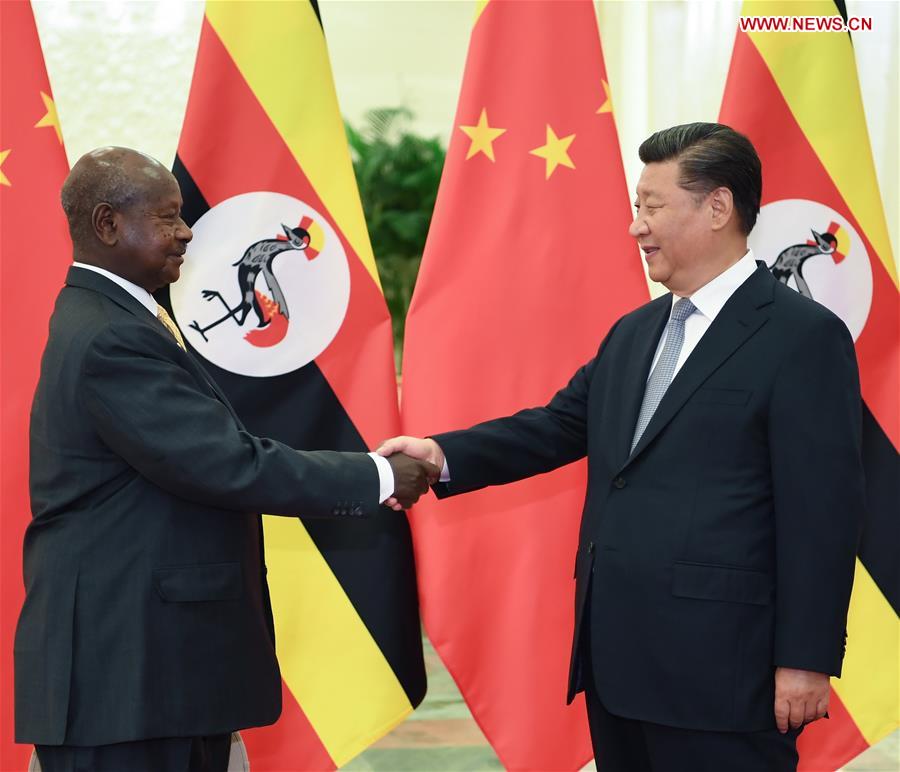By Alan Collins Mpewo
The Chinese Government always attaches great importance to Africa. It has always been an important component of China’s independent foreign policy of peace to develop and strengthen the friendly relations and cooperation with the developing countries, like Uganda. The principles governing the relations between China and Uganda and indeed other African countries put forward by late Premier Zhou Enlai during his tour to Africa in 1960’s is still applicable today. In early 1980’s Chinese leaders proposed four principles on economic and technological cooperation between China and African countries, namely: equality and mutual benefit, emphasis on practical results, diversity in form, and pursuit of common development. During his visit to Africa in May 1996, President Jiang Zemin put forward a five point proposal on developing a long-term and stable relationship of all-round cooperation with African countries oriented towards the 21st century, the core of which being sincere friendship, treating each other as equals, solidarity and cooperation, common development, and looking to the future, thus expounding profoundly the fundamental guidelines and policies of China for developing its friendly relations and cooperation with African countries in the new century.
Selectively chosen, Uganda has benefitted from the fruits of the tree – diplomacy. China and Uganda established diplomatic relations in October 1962. During the period of 1962-1985, bilateral relations witnessed a steady development in spite of the regime changes in Uganda. The two countries saw relatively few high-level exchanges with each other during their first part of the relationship, but Beijing has become a patron of Ugandan diplomacy, for example having donated $6.5 million in 2001 to construct the headquarters building for Uganda’s Ministry of Foreign Affairs, which was opened by 2004.
In recent years, Uganda has benefited a lot from its good relationship with China in several ways. First and foremost, China cancelled Uganda’s $17 million debt that had accrued from interest on loans before 2005, and China agreed to provide a grant of $6.8 million. China also granted tariff-free and quota-free treatment to more than 400 commodities from Uganda. China also plans to loan $350 million to the government to construct a six-lane, 51-kilometer express highway linking the capital city of Kampala to Entebbe International Airport, which will start in 2012 with funding on loan from the Chinese Government. In addition, China has constructed government offices and the state-of-the-art Mandela National Stadium Namboole. In southwestern Uganda, a Chinese road construction company, Chongqing International Construction Corporation (CICO), is constructing a 103-kilometer road linking the western town of Fort Portal to the Democratic Republic of Congo through the mountainous district of Bundibugyo.
China has further strengthened the solidarity and cooperation with Africa, and will makes continued efforts to achieve the goal of common development. Generally speaking, the main points of China’s policy towards Africa are as follows: Adhere to the Five Principles of Peaceful Co-existence, respect the choice of the political system and path of development made by African countries themselves in light with their own national conditions, no interfere in African countries’ internal affairs; support African countries; just struggle in safeguarding national independence, sovereignty, and territorial integrity; support African countries’ efforts in maintaining internal stability and unity, revitalising national economy and promoting social progress.
Support African countries in their efforts to strengthen unity and cooperation and solve their differences and disputes through peaceful negotiations without outside interference; support the positive measures including the implementation of NEPAD taken by the AU and other sub-regional organisations in seeking peace, stability, and development of the African continent, promoting African unity, and realising political and economic integrity.
Strengthen and develop a long-term stable relationship of all-round cooperation with African countries, increase exchange of visits by leaders of China and Africa, enhance personnel exchanges at different levels and in various fields, expand common ground, cement friendship, and promote cooperation.
Continue to provide, to the best of our ability, governmental assistance to African countries without any political conditions, and take measures to improve the performance of the projects built with China’s assistance; take the Forum on China-Africa Cooperation as a new platform and develop economic and trade cooperation with African countries in diversified forms and various fields on the principle of mutual respect, mutual benefit and complementing each other with our respective advantages, and encourage enterprises from both sides to enhance exchanges, enlarge bilateral trade, increase investment and seek common development.
Appeal to the international community especially the developed countries to show more respect and concern for Africa, attach more importance to the peace and development in Africa, adopt feasible measures to increase their aid for Africa, honor their commitment to debt relief, help Africa to solve their problems, promote economic development in Africa, and enable Africa to eradicate poverty so as to narrow the gap between Africa and other parts of the world.
Support African countries in participating and playing a positive role in international affairs as equal members of the international community, continue to uphold justice and speak out for African countries in international arenas, strengthen consultation and cooperation between the two sides, work together to safeguard the legitimate rights and interests of developing countries and strive for setting up a just and equitable new international political and economic order.
Sino-African friendship is in the fundamental interests of both Chinese and African people and has a broad prospect. In the new century, China is ready to further strengthen diplomatic exchanges and increase contacts and cooperation at different levels in various fields with African countries. China is ready to explore together with African countries new areas, new forms and new ways in Sino-African cooperation and scale new heights for Sino-African relations.
Alan Collins Mpewo is a Fellow at Development Watch Centre, a Foreign Policy Think Tank and a Law student at Islamic University in Uganda.



